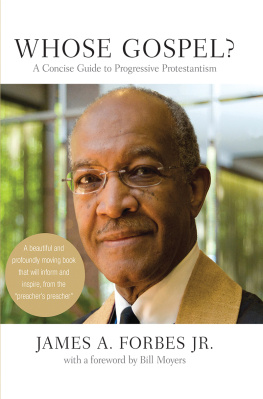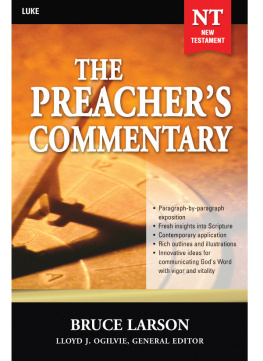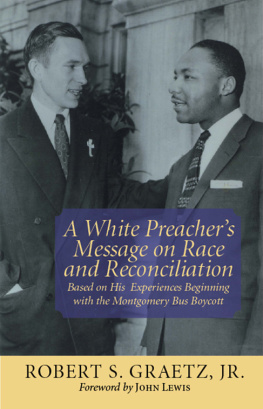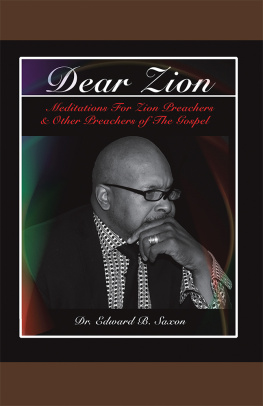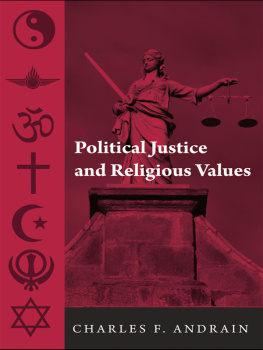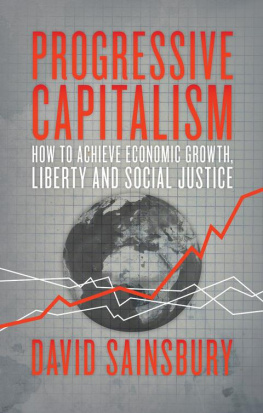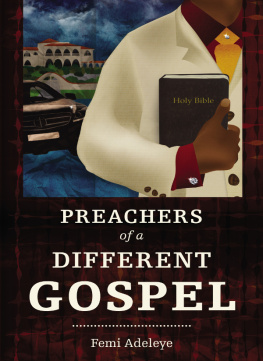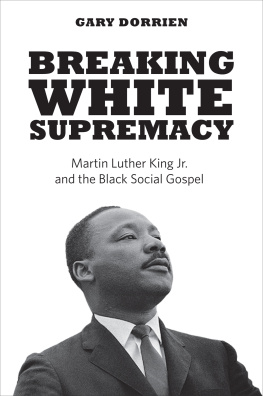
Whose Gospel?
A CONCISE GUIDE TO
PROGRESSIVE PROTESTANTISM
James A. Forbes Jr.

NEW YORK LONDON
2010 by James A. Forbes Jr.
All rights reserved.
No part of this book may be reproduced, in any form, without written permission from the publisher.
Requests for permission to reproduce selections from this book should be mailed to: Permissions Department, The New Press, 38 Greene Street, New York, NY 10013.
Published in the United States by The New Press, New York, 2010
Distributed by Perseus Distribution
ISBN 978-1-59558-397-0 (hc)
CIP data available
The New Press was established in 1990 as a not-for-profit alternative to the large, commercial publishing houses currently dominating the book publishing industry. The New Press operates in the public interest rather than for private gain, and is committed to publishing, in innovative ways, works of educational, cultural, and community value that are often deemed insufficiently profitable.
www.thenewpress.com
Composition by dix!
This book was set in New Caledonia
Dedicated
to my wife
Bettye Franks Forbes
and my son
James Forbes III
who shared most lovingly
my pilgrimage of
faith and understanding.
Foreword
F ive days had passed. Five days since the planes appeared in the bright morning sky, the flames and smoke erupted, the skyscrapers began to tumble, and our hearts trembled at the realization that everything tied down was coming loose.
During those five days people who prayed to the same God and read the same scripture came to very different conclusions about how to respond to the terrorist attacks of 9/11.
The founder of the Moral Majority, Jerry Falwell, said God had passed judgment on America: I really believe that the pagans, and the abortionists, and the feminists, and the gays and the lesbians, the ACLU, People for the American Wayall of them who tried to secularize AmericaI point the finger in their face and say, You helped this happen.
His compatriot, Pat Robertson, the founder of the Christian Coalition, cried Amen, denounced Islam as a violent religion, and warned President Bush not to be duped into thinking otherwise.
Their flame-throwing acolyte, Ann Coulter, called for a holy war on Muslims: We should invade their countries, kill their leaders, and convert them to Christianity.
Across the country those sentiments echoed from one pulpit to another as conservative preachers sounded chords from the old hymn, Onward, Christian Soldiers, as if readying for a twenty-first-century crusade against the whole of Islam.
But in New York City in the wake of the horror, as the debris from the attacks still smoldered and the survivors had only begun to grieve, an altogether different note was sounded at a remarkable event that offered an alternative to the wrath and vengeance.
In the historic Riverside Church overlooking the Hudson River, the Reverend James Forbes Jr. conducted an ecumenical service for people of all faiths, inviting them to unite in contemplation and meditation and to remember that it is the absence of hatred that leads to peace.
The sanctuary overflowed with followers of Jesus, Mohammed, Buddha, and Confucius, along with Jews, Hindus, Sikhs, and others. But the theological distinctions melted as Forbes affirmed that each of the great faiths, in its own way, reflects the universal revelation of a transcendent God. He called on Americans to join with one another and to pray with one another in order that we may discern a path to a more hopeful future than the misery and dread and suffering and death of the last few days.
PBS broadcast the service across the country to an audience as ecumenical as the congregation in the church. To his fellow Christians in particular, Forbes made a pointed appeal as different from the message of Falwell, Robertson, and Coulter as night is from day. Jesus, he said, revealed the capacity to affirm your own tradition and at the same time to reach out to those of other traditions, exhorting his followers, in his very first sermon, to move beyond a nationalistic narrowness to discern the broadness of the heart of God.
The broadness of the heart of God.
This spiritual insight defines what James Forbes means by progressive Christianity, the subject of this book. It is faith with an inclusive embrace of the God whose embrace transcends and exceeds our own. Or as Forbes has been heard to say, God is like his mama, who doesnt think supper is over until the last child is seated and fed.
About so humane a faith there is nothing relativistic or fuzzyheaded. This faith sees the world as it is. After that ecumenical service, when a handful of detractors charged that the presence of Muslims was an offense to the victims of the terrorist attacks, I asked Forbes about the virulent strain of extremism that causes Islamic jihadists to want to do us harm. He answered: There are members of the Islamic faith who are committed to achieving their ends by any means necessary and that includes violence, which I abhor. But there are Christians who are also bent on destroying certain other peopleGood old Americans such as the Ku Klux Klan. As long as we can acknowledge that violence and terror are equal-opportunity visitors, and that they visit all traditions, at least we are not nave in thinking that the only bad people are the bad people of another tradition. Thats hardheaded truth-telling, not wishful thinking.
It was not the most popular message to be sounded after 9/11, but members of The Riverside Church have long been accustomed to hearing an unorthodox critique of prevailing mores from this pulpit. As Forbess predecessor, the Reverend William Sloan Coffin had championed nuclear disarmament and once solemnly and joyfully declared Riverside a sanctuary church for refugees from Central America. Martin Luther King Jr. had preached from the same pulpit five times during the civil rights movement and, exactly one year before his assassination, returned to challenge once again the might and authority of the United States government: If we do not stop our war against the people of Vietnam immediately the world will be left no other alternative than to see this as some hostile, clumsy, and deadly game we have decided to play.
James A. Forbes Jr. was a natural for New Yorks most integrated and ecumenical church, to whose pews came stragglers from every walk of life, refugees from the conformity of stifling dogmatism. Your God is too small, Forbes would declare, and so is our notion of what God expects. He dared to ask: What is God thinking about in these times of war, when the gap between the haves and have-nots is widening and our rulers have abandoned the ideals of equality and justice? In such times Gods heart aches and it is a sin to be silent.
But he never claimed to read Gods palm, or speak Gods mind. Once, as he debated the ethical implications of faith with the late Catholic theologian Father Richard Neuhaus, Forbes said: I do the best I can to say, As I understand the nature of Gods calling, this is an unjust act. But while I strive to function out of a sense of Godly commitment, I would never presume to believe that God would say, Yes, that Jim, thats my boy.
He was, however, a preachers kid born in 1935 in Burgaw, North Carolina. He grew up in the Providence Holy Church in Raleigh, North Carolina, where his father was the pastor. The familythere were eight children of whom James was the oldest sonlived in a three-bedroom home on Bloodworth Street. His mother Mabel was a domestic for a white family on the other side of the starkly segregated town. From start to end, Forbes told me, the predicate of race seemed to insinuate itself into almost everything until we thought of ourselves as a kind of spoiled batch of cookies. God made the other cookies, they were all right. But those of us who stayed in the oven so long that our pigmentation was dark, we were second-class citizens. We didnt believe it. But the power of the circumstances made it necessary to cope with that perception.
Next page
